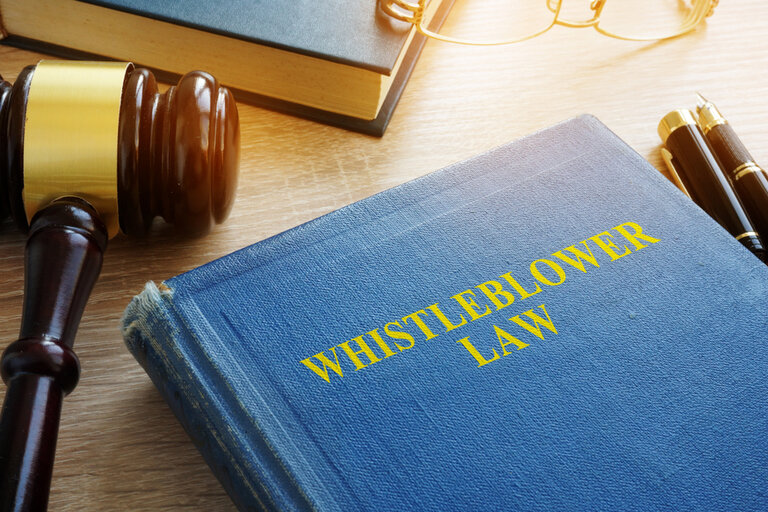Many companies run afoul of the law – skirting regulations, engaging in fraud, and mistreating workers. When companies do this, employees can (and should) speak up to make things right, which is sometimes called “blowing the whistle.” Employees who do this often fear retaliation in the form of a demotion or even termination. Fortunately, Minnesota has one of the nation’s most robust laws for protecting employees who oppose illegal activity.
Understanding the Minnesota Whistleblower Act
The Minnesota Whistleblower Act (MWA) makes it illegal for an employer to retaliate against any employee who reports illegal activity. Minn. Stat. § 181.931, et seq. This retaliation can take many forms: termination, demotion, denying a promotion, reducing a worker’s pay or hours, an unwanted transfer, intimidation, and disciplinary actions are all prohibited.
Also, while speaking up to oppose illegal activity at work is the most common whistleblower scenario, the MWA also provides special protections for employees who “report a situation in which the quality of health care services provided by a health care facility, organization, or health care provider violates a standard established by federal or state law or a professionally recognized national clinical or ethical standard and potentially places the public at risk of harm.” Minn. Stat. § 181.932, subd. 4. Put simply, if hospitals, nursing homes, or other health care facilities are providing care that is substandard, and an employee raises concerns, that employee is protected from retaliation, Consider these examples:
- A nurse reports that surgeons at her hospital are using outdated surgical techniques that are proven to cause health complications for patients. She suspects the surgeons are not adequately trained or that the hospital is encouraging them to use these outdated methods to save money. She reports this to her supervisor. A few weeks after the nurse makes her reports, her supervisor tells her that her position has been unexpectedly “eliminated.”
- A certified nursing assistant notices that proper procedures for dispensing medications are not being followed by the resident care facility where she works. She reports this to the facility’s director. Instead of addressing the issue, the director writes up the CNA and gives her a negative performance review stating that, “this CNA needs to mind her own business and not cause problems.”
- A physician observes certain medications being overprescribed, despite a clear national clinical standard that other medications are proven to be safer for patients. The doctor reports this to the clinic’s executives. One month later, the physician is transferred to a less desirable location with no explanation.
In each of the above scenarios, the person making the report (i.e., the “whistleblower”) is protected by the MWA and could, potentially, bring legal action against their employer. Employees bringing actions under the MWA can sometimes be entitled to significant monetary compensation, and whistleblowers often have a positive impact on their communities by forcing businesses to stop engaging in unlawful activity that puts the public at risk.
Exploring Doculan v. Bayonne Medical Center
In Doculan v. Bayonne Medical Center, a case that took place in New Jersey – which has a state law very similar to the Minnesota Whistleblower Act – provides a real-world example of how state whistleblower laws work. JVR No. 1308190009, 2013 WL 4407657 (N.J. Hudson Cnty. Ct. May 7, 2013). Ceferino Doculan had worked as a technician in a hospital’s blood bank for over 20 years when the hospital hired a supervisor that he believed did not have the proper credentials. Fearing that the supervisor’s lack of credentials and training would put patients at risk, he complained to the hospital about improper staffing.
The hospital did not address Doculan’s staffing concerns, choosing instead to discipline and ultimately fire Doculan. At trial, a jury found that the hospital had fired Doculan as an act of retaliation for his complaints and awarded him $2,000,000 in punitive damages, $80,000 in lost wages, and $60,000 in pain and suffering. By speaking up, Doculan was able to hold his employer accountable and ensure that patients receive care from qualified, competent medical professionals.
Seek Guidance From Our Experienced Legal Team Today

The Minnesota Whistleblower Act protects employees who do the right thing to make sure their fellow Minnesotans receive the health care they deserve. However, like all legal matters, there are complicated loopholes and technical rules to navigate. Fortunately, the attorneys at MSB Employment Justice have years of experience holding health care organizations accountable for their unlawful retaliation. If you’re experiencing retaliation or discrimination in the workplace due to reporting substandard care or opposing any illegal activity, one of MSB’s experienced whistleblower attorneys can guide you through the process of seeking the justice you deserve. Contact us today to speak with our experienced legal team.



